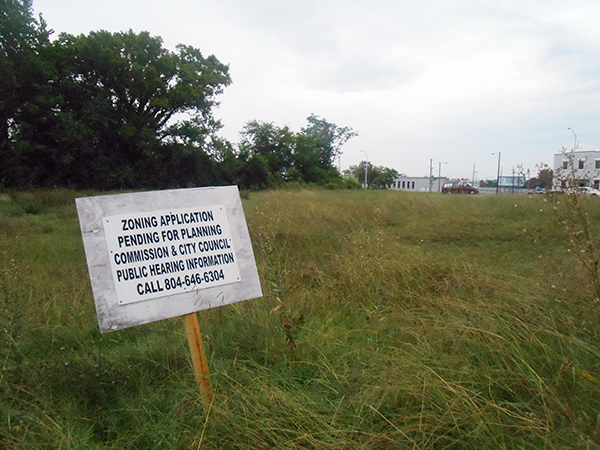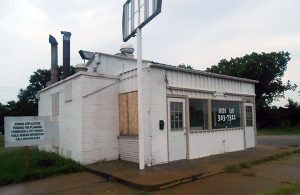It’s a classic real estate adage: Retail follows rooftops.
A few years ago, an apartment building and conversion spree took hold of Richmond’s Southside Manchester neighborhood. Almost 1,000 units later, local developer Wayne Cole has plans to drop 9,000 square feet of retail into the growing community.
“They don’t have shopping around there, retail, anything like that,” Cole said.
Cole is set to take plans for a Dollar Tree at the southeastern corner of Cowardin and McDonough streets to the city’s planning commission today. Cole’s family has owned the property, which most recently housed Boyd’s Cafe, for about 50 years. If approved, the Dollar Tree would be the space’s first retail use since it housed a used car lot in the 1950s, Cole said.
The project could be an indicator of what’s to come in a neighborhood that has reaped the rewards of the state’s historic tax credit program. Thirty-seven rehab projects have been approved for tax credits in Manchester since 1997, with four more in the application process, according to the Virginia Department of Historic Resources, which administers the program.
The Manchester development playbook has been one-dimensional so far in its drive toward apartments. There are at least four residential developments set to come online next year in the nine-block stretch between Semmes Avenue and Stockton Street. Cole thinks his project could be a leading edge on a shift toward retail.
“Obviously, big businesses are looking at the Old Manchester area,” he said. “This store is just another tool or supplement to feed into the overall Manchester plan.”
Although Dollar Tree does stock some groceries, commercial real estate brokers and developers say a big-box supermarket is likely the next step in the community.
Rob Hargett, whose Midlothian-based Rebkee Development owns more than 15 shopping centers with grocery store tenants, said it might be just a matter of time.
“Definitely the demographics are screaming for those people to have a place to shop at,” Hargett said. “It’s kind of a no-brainer.”
Hargett, whose holdings include shopping centers with both Kroger and Food Lion as anchor tenants, called Kroger the most likely suitor for a potential Manchester supermarket, at least for now.
“The only one they would have would be Kroger,” he said. “Walmart Neighborhood Market isn’t going to go. Food Lion isn’t doing any deals.”
Martin’s supermarket spokesman Chris Brand said population density is an important factor when his company scouts locations for new supermarkets, as is access to roads and highways.
“Obviously, a spike in population and housing development – those are good signs for us when we’re out looking,” Brand said.
Martin’s does have target population numbers it looks for in new developments, but Brand would not divulge specific benchmarks.
The Reynolds South site has been the epicenter of Manchester market murmurs over the past year. The 18-acre property fronts Hull Street and the James River and is one of the city’s largest developable tracts of land.
Developer Tom Wilkinson had the former industrial plant under contract last year, but the deal fell apart in November. Thalhimer Realty Partners has moved in on the property and has it under contract.
The firm is not negotiating a supermarket project at this time, but Jeff Cooke of Cushman & Wakefield | Thalhimer’s brokerage division said Reynolds South would be a good place for a grocer in the future.
“That seems to be the logical place for that type of development,” he said. “I think it will occur. I can’t tell you what day.”
Cole is aiming to finish his construction on the Dollar Tree store in February. He expects costs will run about $2 million, and he said the proposed development has been well received by Manchester residents.
“I want it to be a staple of the Old Manchester area,” he said.
It’s a classic real estate adage: Retail follows rooftops.
A few years ago, an apartment building and conversion spree took hold of Richmond’s Southside Manchester neighborhood. Almost 1,000 units later, local developer Wayne Cole has plans to drop 9,000 square feet of retail into the growing community.
“They don’t have shopping around there, retail, anything like that,” Cole said.
Cole is set to take plans for a Dollar Tree at the southeastern corner of Cowardin and McDonough streets to the city’s planning commission today. Cole’s family has owned the property, which most recently housed Boyd’s Cafe, for about 50 years. If approved, the Dollar Tree would be the space’s first retail use since it housed a used car lot in the 1950s, Cole said.
The project could be an indicator of what’s to come in a neighborhood that has reaped the rewards of the state’s historic tax credit program. Thirty-seven rehab projects have been approved for tax credits in Manchester since 1997, with four more in the application process, according to the Virginia Department of Historic Resources, which administers the program.
The Manchester development playbook has been one-dimensional so far in its drive toward apartments. There are at least four residential developments set to come online next year in the nine-block stretch between Semmes Avenue and Stockton Street. Cole thinks his project could be a leading edge on a shift toward retail.
“Obviously, big businesses are looking at the Old Manchester area,” he said. “This store is just another tool or supplement to feed into the overall Manchester plan.”
Although Dollar Tree does stock some groceries, commercial real estate brokers and developers say a big-box supermarket is likely the next step in the community.
Rob Hargett, whose Midlothian-based Rebkee Development owns more than 15 shopping centers with grocery store tenants, said it might be just a matter of time.
“Definitely the demographics are screaming for those people to have a place to shop at,” Hargett said. “It’s kind of a no-brainer.”
Hargett, whose holdings include shopping centers with both Kroger and Food Lion as anchor tenants, called Kroger the most likely suitor for a potential Manchester supermarket, at least for now.
“The only one they would have would be Kroger,” he said. “Walmart Neighborhood Market isn’t going to go. Food Lion isn’t doing any deals.”
Martin’s supermarket spokesman Chris Brand said population density is an important factor when his company scouts locations for new supermarkets, as is access to roads and highways.
“Obviously, a spike in population and housing development – those are good signs for us when we’re out looking,” Brand said.
Martin’s does have target population numbers it looks for in new developments, but Brand would not divulge specific benchmarks.
The Reynolds South site has been the epicenter of Manchester market murmurs over the past year. The 18-acre property fronts Hull Street and the James River and is one of the city’s largest developable tracts of land.
Developer Tom Wilkinson had the former industrial plant under contract last year, but the deal fell apart in November. Thalhimer Realty Partners has moved in on the property and has it under contract.
The firm is not negotiating a supermarket project at this time, but Jeff Cooke of Cushman & Wakefield | Thalhimer’s brokerage division said Reynolds South would be a good place for a grocer in the future.
“That seems to be the logical place for that type of development,” he said. “I think it will occur. I can’t tell you what day.”
Cole is aiming to finish his construction on the Dollar Tree store in February. He expects costs will run about $2 million, and he said the proposed development has been well received by Manchester residents.
“I want it to be a staple of the Old Manchester area,” he said.





Very excited about this!!! not particularly excited about the Dollar Tree, but excited for the development. i think a different store would have been better, but i guess sometimes you gotta take what you can get.
So will this just be a cookie cutter store or will it be like the dollar tree on broad next to the VCU campus with some distinction because it will be facing a heavy traveled street which will be seeing much more development in the future.
Manchester would be a good area for a Community Pride (if they were still around.) Say what you like about Johnny Johnson, but he made the “city model” work for the grocery category.
The City and its Citizens need to make sure these plots are developed as walkable – stores fronting the street with parking mid-block, adequate sidewalks, bus stops, bike parking. Let’s not let Manchester become a sea of parking lots a la the rest of Jeff Davis. Would that be something the Planning Commission has some control over?
I hope that there is more to come for the Manchester area. Resturants retail etc
Zeke,
The Manchester Alliance shares your concerns and is working hard on these issues. We did not support the Special Use Permit for this project because the site plan was suburban in nature. The Planning dept at the City also did not support. The applicant is trying to address these issues, and our association eagerly awaits revised renderings and site plans.